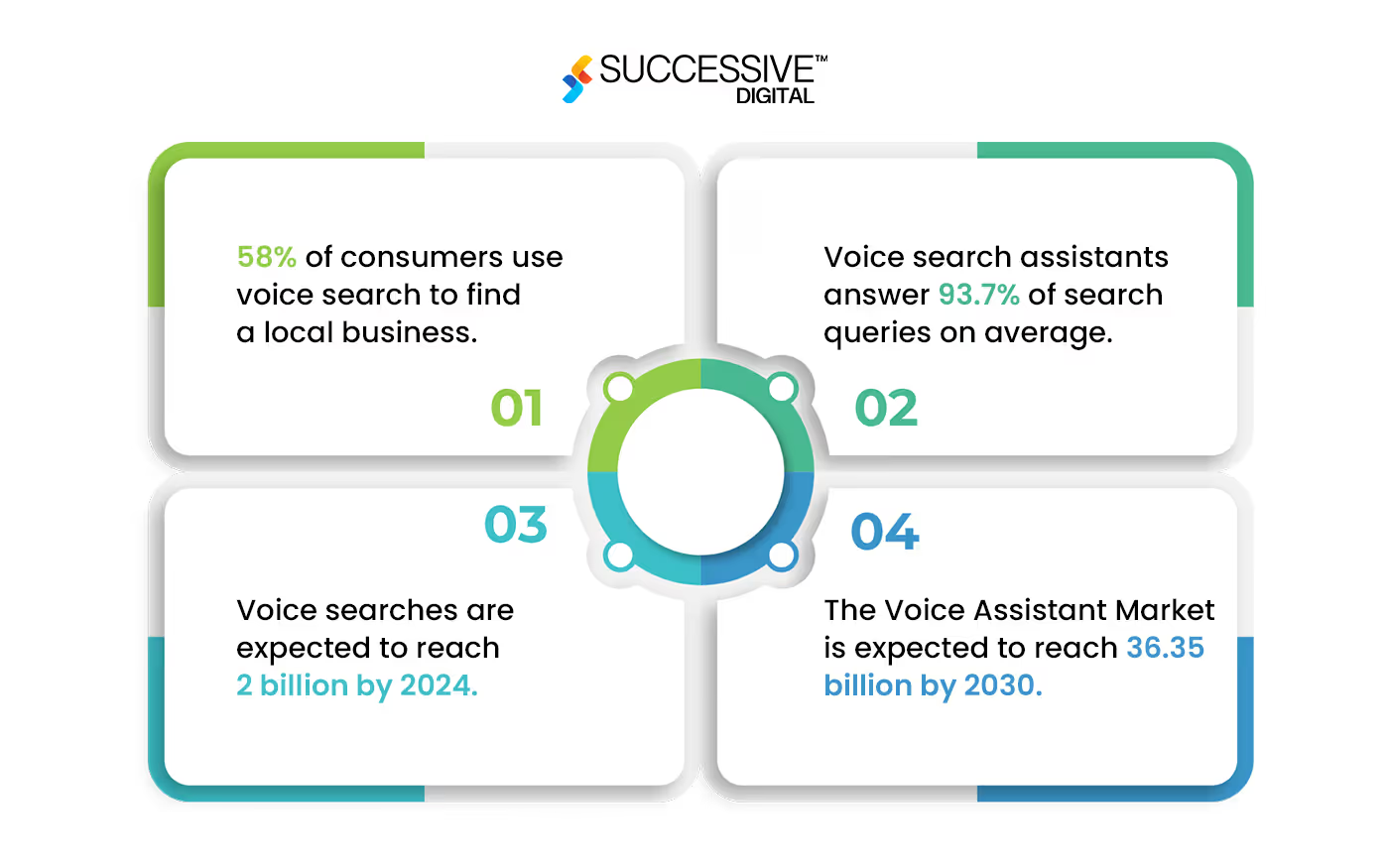Imagine having continuous assistance to perform crucial tasks or day-to-day activities to reduce your burden significantly. This is the power of AI virtual assistants. It helps you accomplish many functions, including playing your favorite music, getting news updates, controlling electronic home appliances, or drawing a vast amount of information at a single command.Increasing automation in businesses and ease of use in regular applications has led to a boom in voice assistant app development. Hence, enterprises building mobile apps integrate voice assistance capabilities like Amazon Alexa, Microsoft Cortana, or Apple Siri, facilitating more effective and robust management.In the digital revolution era, the number of digital voice assistants is expected to reach 8.4 billion units by 2024, which is higher than the world’s population. When the use of AI technology is growing extensively, businesses are building their own personal assistants rather than depending on any other platforms to acquire these capabilities.
What is a Voice Assistant App?
A voice assistant app interacts with people impersonating real-life human communication via web, mobile, or desktop applications. Various platforms and gadgets, from mobile applications to smart speakers and wearables, are integrated with voice assistant software. Depending on the device, these applications perform multiple tasks— from controlling home appliances and creating a digital shopping list to answering user queries.With natural language processing (NLP) and artificial intelligence (AI) techniques, including machine learning (ML), these applications process data and provide accurate responses accordingly. Moreover, learning from user interactions, voice assistants enhance conversational capabilities.
What are the Benefits of AI Voice Assistant App Development? Market Statistics

Due to increased user demand, technology is shifting towards voice or speech recognition. The key driving force of this change is the ability to interpret dictation or voice-enabled commands instead of typing.In order to improve your business operations and customer service, you must see how you can use AI voice assistant apps like Alexa.
- Saves Time and Effort
The foremost benefit of developing a voice assistant app like Alexa is that your business can save time and effort. Rather than relying on messages and emails, the customer service operator can use voice commands to handle time-consuming interactions with ease and minimal resources.
- Personalized Experience
Voice assistant apps like Alexa, embracing intelligent technologies like AI, can issue more personalized responses curated for your audience's specific needs. Hence, you can offer detailed, customized solutions to your target audience, boosting customer service offerings.
- Cost Savings
With voice assistants, your business will be able to minimize manual inputs and reduce operating expenses significantly. Moreover, AI gives you a lot of opportunities to save money by automating several tasks.
- Improved Customer Service
Overhaul your traditional customer service approach with AI voice assistant app development. Also, it enhances convenience for customer support interactions by using innovative tactics.Want to know the benefits of AI for enterprises? Read our blog “How AI Can Strengthen Innovation for Consumer Businesses?” to know more.
- Faster Operations
Developing a voice assistant app provides new ways for customers to connect with the organization, improving the customer service response rate and facilitating a positive customer experience. Moreover, the fast responses from such apps engage your customers on a deeper level.
- Improve Business Recovery Rates
You can overhaul your traditional customer service approach with AI voice assistant app development. Instead, you can enhance convenience for customer support interactions by using innovative tactics.
Popular Voice Assistant Apps Used Worldwide

Technological advancements have opened up new opportunities for companies to develop powerful voice assistants like Alexa with unique personalized experiences. Hence, to keep up with the changing times, anyone can build systems to voice-enable their devices, websites, or gadgets today.Whether you want to make a shopping list, call your friends/ family, send emails, or create a to-do list, voice assistants can make your life easier. Apple, Samsung, Amazon, and Google are huge players in this field. With their technology expertise and widespread solutions, they are facilitating an effortless lifestyle.
What Makes Alexa a Popular Voice Assistant App?
The U.S. market is dominated by the voice-activated smart speaker running the Alexa voice assistant, with 65% of consumers. Google Home and Apple’s HomePod are the following popular choices, with 26% and 19% of smart speaker owners, respectively.
- Ease-of-use
The primary ground of this growing popularity is convenience. i.e., making things easy for people. Whether an adult, elderly, or a child, they can get instant results with just a few voice commands. With just a few voice commands, users engage in a wide array of tasks, making their digital interactions seamless and hands-free.
- Brand Value
With unparalleled voice recognition capabilities and seamless integration with Amazon's vast products and services, Alexa has established itself as one of the most influential brands. When no one could have predicted how fast AI would change the app development landscape, Alexa became synonymous with smart home automation, entertainment, and everyday convenience.Hence, you can learn from the success of Alexa and adopt a user-centric approach to lay the foundation for long-term success in the rapidly evolving voice technology landscape.
How to Make a Voice-Assistant App Like Alexa?
To enhance your app with voice and natural language features, relying on cloud options is crucial. Cloud services offer efficient and scalable solutions, allowing your application to leverage advanced capabilities like voice recognition and natural language processing without requiring extensive local infrastructure.Cloud service providers offer application programming interfaces (APIs) that streamline the data traversing for performing computational tasks and return the results. Hence, it enables your apps to interpret and respond to user inputs.This was the process of incorporating voice and natural language capabilities into an application using cloud services. However, you need to follow this broader approach for voice assistant app development like Alexa from scratch, which uses Conversational AI.
1. Plan Your AI Voice Assistant App Strategy
The first step is to define the objective of your voice assistant app, including key features and functionalities. Select the platform you want your app to run on, including mobile devices, smart speakers, or other platforms.Moreover, define your target audience and characterize them according to components like age, salary, area, and occupation. This will help you design your app as per their needs and convenience.
2. Decide on AI Voice Assistant App Features
In order to develop a voice assistant app like Alexa, you can integrate the following features as per the app's objective.
- Voice Recognition
Incorporating speech-to-text conversion to interpret the user command accurately.
- Wake Word Detection
This feature activates the voice assistant app using a particular word or phrase. It allows the user to initiate commands without pressing a button.
- Multi-Functional Commands
Your voice assistant app should be able to support a variety of commands, including making calls, sending messages, and playing music.
- Query Resolving
Train your app to provide information and answer general knowledge questions.
- Personalization
Customize the responses based on user preferences and learn to respond accordingly by embracing AI technology.
- Smart Home Control
Controlling smart home devices, such as lights, thermostats, cameras, and other connected appliances.
- Location-Based Services
The app must offer location-specific information, such as local businesses, weather, and traffic updates.
- Calendar and Reminder Integration
Integrating the feature to manage schedules, set appointments, and send reminders.
- Language Translation
Increase the adoption rate of your app by integrating it with translating phrases or sentences between different languages.
- Security and Privacy
Implement robust security features to protect user data and provide strong privacy settings.
- Accessibility Features
Test your app for accessibility to enable individuals with visual impairments to access information and interact with digital devices seamlessly.
3. Choose the Suitable Technology
For voice assistant app development, your app developers can use a combination of technologies. Conversational AI is at the forefront of empowering machines to impersonate human intelligence, learn from data, and make intelligent decisions.On the other hand, ML (a subset of AI technology) improves system performance with continuous learning, optimizing the AI voice assistant app to present more suitable responses. To integrate your app's vast computational power and storage capabilities, leverage scalable and accessible resources with cloud computing.A voice assistant app, connected to various devices like home appliances or smart speakers, requires seamless data sharing. The Internet of Things (IoT) allows incorporating this communication capability.These were the base technologies contributing to the dynamic voice assistant app development. However, building an app like Alexa requires appropriate skills and technical expertise.
- Natural Language Processing (NLP)
NLP technology is the field of AI that focuses on the interaction between computers and humans using natural language. Integrating your app with this tech enables you to comprehend and interpret the meaning of user queries expressed in natural language.
- Text-to-speech (TTS) Engine
This engine converts the text or image to human-recognized speech and reads digital text aloud, giving your application better accessibility.
- Voice/Speech-to-text Engine
This is the opposite of the TTS engine, which converts the user’s command into digital text through computational linguistics.
- Intelligent Tagging and Decision-Making
With intelligent tagging and decision-making capability, your app can interpret users' requests. For example, a user wants a list of top-rated restaurants. This technology will tag the restaurants in the area and suggest suitable ones.
- Noise Reduction Engine
The noise reduction or cancellation engine cancels out the background noise to facilitate clear voice recognition. This technology is crucial to improve the overall user experience of your app.
- Voice Biometrics
With rising security concerns online, it is essential to implement robust measures to safeguard your AI voice assistance app like Alexa. By integrating voice biometrics, your app can identify whether or not an authorized person is giving commands.
- Voice user interface (VUI)
Setting up the voice interface means managing the speech rate, voice modulation, and way of speaking or picking the suitable voice for your brand. This will ensure you provide users with a human-like app experience.
4. Select a Method to Integrate a Voice Assistant
Mobile app developers follow three methods to develop a voice assistant app as per the objective. Let’s understand these approaches in detail.I. Method (Good Bots)This method integrates voice technology within your app through APIs and a development kit. Google Dialogflow, IBM Bluemix, and Microsoft Bot Framework provide libraries, tools, and services that enable developers to build intelligent bots. These platforms are widely used to create interactive cloud-based chatbots and voicebots, which can also be exported to Google or Alexa.II. Method (Expert Bots)Developers can use APIs and open-source tools like Jasper to build a smart voice assistant app. Moreover, Rasa, a conversational AI software, can be employed to create text and voice-based assistants with improved customizability and custom coding. These expert bots can be seamlessly deployed on your system or cloud.III. Method (Basic Bots)This method involves building a voice assistant app for smaller requirements where defined paths/responses are sufficient. Since there is no need to understand human languages at an advanced level, these assistants can be developed with coding. The crucial component here is to ask the right questions to specify routes for new conversations tailored to your business needs.Depending on your app’s objectives, select the method that best fulfills your expectations. It is important to note that creating a voice assistant app like Alexa from scratch can be a daunting task. Therefore, you can consider hiring a reliable AI app development company to address the challenges and build an engaging voice assistant app.
How Much Does Voice Assistant App Development Cost?
Do you want to know the cost of developing a voice assistant app like Alexa? Various factors like app complexity and a number of features affect the total development price. Considering these parameters, building an app like Alexa (for iOS and Android platforms) would cost around $50,000-$150,000. This cost can be more than $300,000 if your app is highly complex or requires to connect with speakers or wearable devices.After the app development, you must ensure the app maintenance process runs smoothly. Therefore, you can set a budget aside for continuous app development based on factors like hosting, support services, licensing, and marketing.Lastly, the total cost of building an app like Alexa is also influenced by the charges of hiring a professional app development company. This price varies according to the location, hiring model, expertise, and skills.Read our blog on mobile app development costs to dive deeper into the cost-driving factors.
Develop a Voice Assistant App With Successive Digital
At Successive Digital, we leverage over a decade of expertise, having successfully assisted 150+ enterprises in designing, developing, and deploying successful digital solutions. Our commitment to excellence positions us as a trusted partner for businesses looking to create robust voice assistant apps that redefine user experiences. With a proven track record in the tech industry, we specialize in creating intuitive and feature-rich voice assistant apps, catering to the unique requirements of our clients.Contact us today to unlock the potential of your voice assistant app idea.
.avif)
![AI Voice Assistant App Development Like Alexa [Complete Guide]](https://cdn.prod.website-files.com/699c025bab494a3ef56a6756/699c025bab494a3ef56a7af0_678e39b2c5d9cbf98b575038_AI-Voice-Assistant-App-Development-Like-Alexa.avif)
.webp)



.webp)














